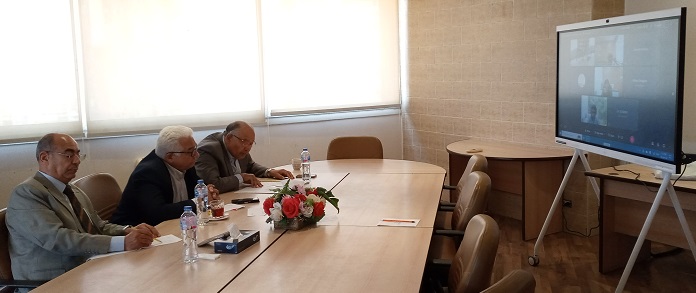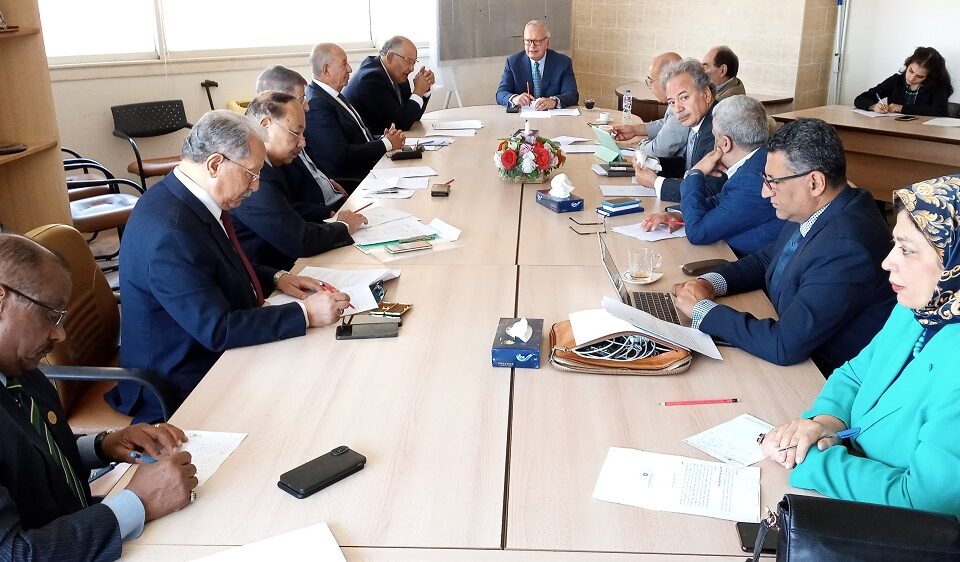Ambassador Ezzat Saad participates in a symposium on “The June 2013 Revolution and Egyptian foreign policy… challenges and achievements” at the Supreme Council of Culture
July 12, 2023Seminar on “Developments of the situation related to the Nile waters issue and the Renaissance Dam”
July 19, 2023
On July 18, 2023, at the invitation of Ambassador Dr. Mohamed Badr al-Din Zayed, coordinator of ECFA’s Permanent Committee on Arab Affairs, ECFA held a seminar in which Mr. Fawzy Ammar Hassan Al-Lulki, a Libyan writer specialized in the field of investment and international cooperation, and member of the economic team of the Berlin Conference on Libya, spoke about “Developments of the Economic and Financial Conditions in Libya,” and the ongoing debate in this regard inside Libya and abroad. Ambassadors Ahmed Abdel Meguid, Director of the Libya Department at the Ministry of Foreign Affairs, Ezzat Saad, ECFA Director, and Youssef El-Sharqawy, ECFA member, participated in the meeting.
In this regard, Mr. Al-Lulki gave a comprehensive presentation of the Libyan scene and its developments since the outbreak of the February 2011 revolution, describing this scene as fragile and involving a high degree of chaos, amidst the intense political rivalry and armed conflict between the governments of eastern and western Libya, as well as regional and international foreign interventions in Libyan affairs, which made the matter only get worse, starting with the NATO intervention in 2011, which led to the disintegration of many state institutions, especially the military institution, in exchange for the growing role of military militias, and the spread of weapons in the Libyan streets until they have now reached about 20 million pieces. In general, Libya can now be called Libyan society, because it is a pre-state stage, especially under the absence of a constitution to date, and the United Nations support mission for Libya is in fact devoid of the mechanisms necessary to activate it. Hence, it is noted that the United Nations always insists that the conflict in Libya is primarily a political conflict between the Libyan factions, and not a legal dispute that is easy to resolve.
On the economic level, the guest indicated that cooperation in this field may be an impetus towards resolving the crisis, in light of the awareness of all Libyan parties that military warfare will not lead to a solution, and there is now talk about the possibility of implementing a market economy in the country. However, it can be said that this type of economy will not solve the crisis of how to distribute oil revenues in a fair manner that satisfies all parties. Therefore, some advocate a mixed economy in which the official authorities play a relatively large role in managing economic affairs in the country, and this may in fact be the first option. In a related context, the guest noted that the West, led by Washington, is primarily concerned, in connection with Libya, with Libyan oil; to compensate for the lack of Russian energy resources, and to combat the presence of elements of the Russian Wagner company in Libya. On its part, Russia will never accept the exit of these elements without obtaining guarantees that achieve its interests, such as reviving its partnerships that it had previously concluded with the Gaddafi regime.
On the other hand, the guest called for the necessity of Egyptian-Libyan cooperation in the fields of infrastructure and others, and bringing additional Egyptian companies and workers into Libyan territories, as well as tripartite cooperation in Africa, given that Libya is a crossing point for many goods and merchandise to neighboring countries in the Sahel and Sahara region. He also proposed that Egypt, Russia, and Libya cooperate in extending the railway line from the Ain Sokhna area along the northern coast of Egypt, Libya, Tunisia, and Algeria, to enhance trade exchange in these countries. This is in addition to development cooperation between Egypt and Türkiye in Libya, which will be welcomed by all Libyan parties.






